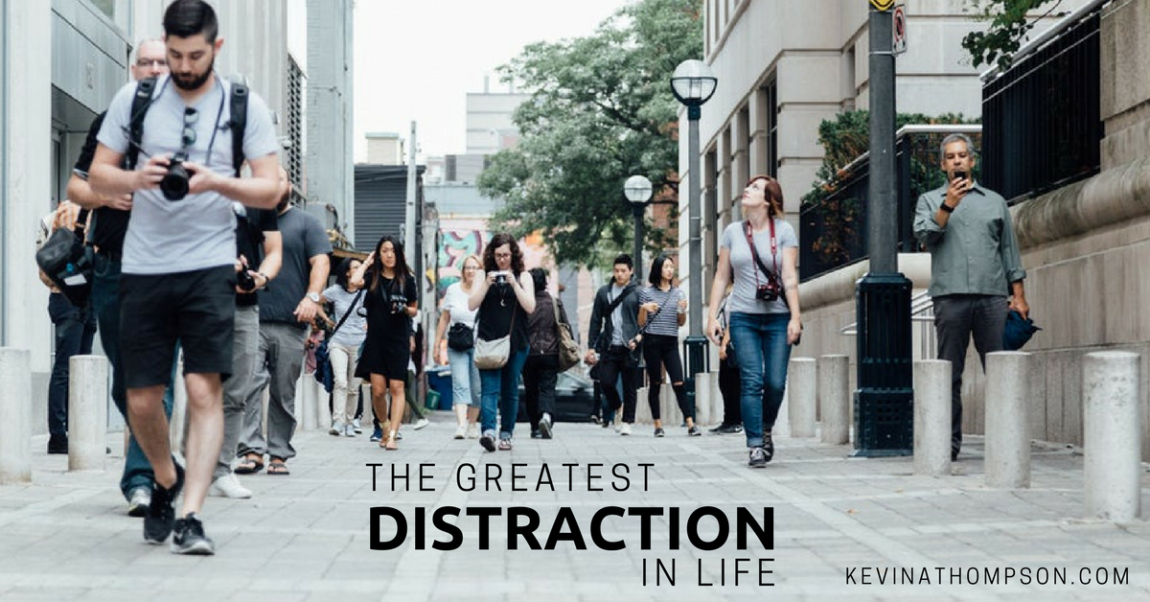The key to magic is misdirection. Either by directing your attention toward one hand as the other hand secretly does something or by making you believe something big is happening when in reality it has nothing to do with the trick, a good magician is skilled at directing an audience’s attention where they want it to go. As an audience is distracted, the magician can do what he wants.
In magic, distraction leads to entertainment. It causes us to believe things occurred which are physically impossible. It prevents us from drawing proper conclusions and understanding the true interworkings of how things took place.
In life, distraction leads to exhaustion. It causes us to draw faulty conclusions. It tempts us to believe that certain behaviors will lead to outcomes which they certainly won’t create. It prevents us from rightly understanding cause and effect, frustrating us as we continually are thwarted from getting what we desire.
Distractions in our lives are many.
Money. It gives the appearance of bringing security, meaning, and peace, but it never does.
Power. We believe that attaining power will ensure security, but some of the most insecure people in life possess power.
Fame. It may be the currency of our day. Many kids would take fame over money. We believe if we are famous, life will be easy.
Technology. It continually screams for our attention and rewards us like a drug when we give it what it wants.
While there are many distractions in the modern world, there is one which negatively impacts us more than any other. The greatest distraction of our lives is what is going on in the lives of other people. Nothing distorts our thinking, confuses our direction, and leads us down destructive paths like our fixation on others.
My kids are 12 and 9. Hardly a day goes by in which I don’t hear the phrase, “That’s not fair.” He doesn’t like how much screen time she is allowed. She doesn’t like that he got to have a friend over. He complains that she didn’t empty her half of the dishwasher. She believes he got a bigger piece of the cake. Nearly everything in their lives is defined not by what they have, but by what they have in comparison to their sibling. (See: What God Says About Other People)
We would think this is a phase we grow out of as we mature, but we don’t. It’s possible that adults are worse about the comparison game than children.
We could have the greatest job ever, making more money than we ever imagined, but if a co-worker becomes our boss or we find out someone else is making more money than us, we can quickly dislike our job.
It’s embarrassing to consider how many purchases are determined by our friends. They buy something and without even recognizing their influence, we purchase something as well. Unknowingly, we are attempting to keep up with them or we assume we deserve something as well.
We may be perfectly content with the house in which we live, but then our friend buys a new house. We visit and notice all the new aspects. When we go home, we are tempted to look at our old house and familiar neighborhood in a negative light.
How Others Distract Us
Fixation on others has several negative consequences in our lives. Whenever we focus on others, we take our focus off of our own responsibilities. We try to change them while failing to do the work necessary to change us. Among the many problems of focusing on others, the greatest may be that we cannot rightly interpret what’s going on in the lives of other people. We can’t even rightly interpret what’s going on in our own lives most of the time, what chance do we have to understand the full story of other people. We judge their outward appearance while not knowing what’s truly going on behind the scenes. Maybe they’ve done more work than we realize. Maybe what we view as a great outcome is really horrible. Maybe they are far more tender-hearted and kind than we realize. The truth is, we don’t know. If we don’t know, we can’t rightly interpret what is happening. But this doesn’t keep us from assuming that the story we have written is true.
When we focus on the actions, attitudes, and outcomes of others we create false conclusions, waste valuable time, and miss the opportunity to love/serve them. We can’t love those we judge. We can’t serve others when we are jealous of them.
It’s vital that we recognize the process which comes to us so naturally–fixating on others–is in fact toxic. Nothing good will come from comparing our lives to the lives of those around us. When we avoid this distraction, we are far more likely to make wise choices, better understand cause and effect, and relate with others in a healthy manner.





2 Responses to The Greatest Distraction in Life